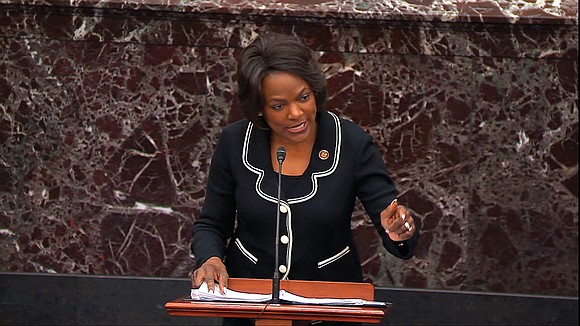Trump impeachment trial opens with GOP Senate majority rejecting Dems' attempts to bring in new witnesses
Free Press wire reports | 1/24/2020, 6 a.m.

WASHINGTON - The U.S. Senate plunged into opening arguments Wednesday in President Trump’s impeachment trial, with Democratic House managers detailing the case that the president abused his power and should be removed from office.
After late-night deliberations over the rules almost ensured no new witnesses will be heard, the trial picked up speed. There were few signs of Republican resistance to quickly assessing — and voting — on charges related to President Trump’s dealings with Ukraine.
With a Republican majority, the Senate rejected all attempts by Democrats to bring in new witnesses — including top Trump aides — to expose President Trump’s “trifecta” of offenses and are likely to do so again next week, shutting out any chance of new testimony.
U.S. Supreme Court Chief Justice John Roberts gaveled open the session as senators settled in for a several long days of proceedings.
President Trump, who was in Davos, Switzerland, attending a global economic forum, suggested Wednesday he would be open to his advisers testifying, then quickly backtracked, saying there were “national security” concerns that would stand in the way.
A marathon session of nearly 13 hours started Tuesday with a setback for Republican Senate leader Mitch McConnell and the president’s legal team, exposing a crack in the GOP ranks and the growing political unease over the historic impeachment proceedings unfolding amid a watchful public in an election year.
But the session ended around 2 a.m. Wednesday with Republicans easily approving the new trial rules largely on their terms.
“It’s about time we bring this power trip in for a landing,” said White House counsel Pat Cipollone, the president’s lead lawyer, lashing out at the House Democrats prosecuting the case.
“It’s a farce,” he said about the impeachment proceeding, “and it should end.”
Chief Justice Roberts opened the trial Tuesday afternoon with House prosecutors on one side and President Trump’s team on the other in the well of the Senate as senators sat silently at their desks, under oath to do “impartial justice.” No cell phones or other electronics were allowed.
As the day stretched deep into the night, lawyerly arguments gave way to more pointedly political ones. Tempers flared and senators paced the chamber. Democrats pursued what may be their only chance to force senators to vote on hearing new testimony.
After one particularly bitter exchange, Chief Justice Roberts intervened, taking the rare step of admonishing both the Democratic House managers and the White House counsel to “remember where they are.”
“I think it is appropriate at this point for me to admonish both the House managers and the president’s counsel in equal terms to remember that they are addressing the world’s greatest deliberative body,” the usually reserved chief justice said.
He told them that description of the Senate stemmed from a 1905 trial when a senator objected to the word “pettifogging,” because members should “avoid speaking in a manner and using language that is not conducive to civil discourse.”
Over and over, Republicans turned back Democratic amendments to subpoena documents from the White House, State Department, Defense Department and budget office.
By the same 53-47 party line, they turned away witnesses with front-row seats to President Trump’s actions, including acting White House chief of staff Mick Mulvaney and John Bolton, the former national security adviser critical of the Ukraine policy.
Only on one amendment, to ensure a vote later on additional witnesses, did a single Republican, Sen. Susan Collins of Maine, join Democrats. But it, too, was rejected 52-48.
As the hours mounted, Senate Minority Leader Chuck Schumer brushed back an offer from Sen. McConnell to more quickly stack the votes.
“It’s not our job to make it easy for you,” Rep. Adam Schiff, the chairman of the House Intelligence Committee leading the prosecution, told the Senate. “Our job is to make it hard to deprive the American people of a fair trial.”
As the visitors’ gallery filled with guests, actress-and-activist Alyssa Milano among them, and President Trump’s most ardent House allies lining the back rows, the day quickly took on the cadence of a trial proceeding over whether the president’s actions toward Ukraine warranted removal from office.
Earlier, Sen. McConnell stunned senators and delayed the start of proceedings with his decision to back off some of his proposed rules. Republicans were said to be concerned over the political optics of “dark of night” sessions.
Instead, 24 hours of opening arguments for each side will be spread over three days that started Wednesday, for a mo- ment swelling Democrats’ momentum as they push to break the standoff over calling new witnesses.
Mr. Cipollone led the prosecution, scoffing that the House charges against President Trump were “ridiculous,” insisting the president “has done absolutely nothing wrong.”
The White House legal team did not dispute President Trump’s actions, when he called Ukraine and asked for a “favor,” which was to investigate Democrat Joe Biden as the United States was withholding military aid the ally desperately needed as it faced off with hostile Russia on its border. But the lawyers insisted the president did nothing wrong. “Absolutely no case,” Mr. Cipollone said.
Rep. Schiff, the California Democrat, opened for the prosecu- tion saying America’s Founders added the remedy of impeach- ment in the Constitution with “precisely this type of conduct in mind — conduct that abuses the power of office for a personal benefit, that undermines our national security, and that invites foreign interference in the democratic process of an election.”
Said Rep. Schiff: “It is the trifecta of constitutional misconduct justifying impeachment.”
One by one, the House managers made the case against President Trump, drawing on their own life experiences. Rep. Val Demings, a Florida Democrat and former police chief, said she never saw anyone take “such extreme steps to hide evidence.”
Rep. Jason Crow, a former Army Ranger who served in Iraq and Afghanistan, seemed to capture senators’ attention when he told them he knew the hour was late, but it was morning in Ukraine where soldiers were waking up to fight Russia, depending on U.S. aid.
Legal scholars have long insisted the framers of the U.S. Constitution provided impeachment as a remedy for “other high crimes and misdemeanors,” a particularly broad definition that doesn’t mean simply specific criminal acts.
Democrats point in particular to a General Accountability Office report that found the White House violated federal law by stalling money to Ukraine that had been approved by Congress.
No president has ever been removed from office by the Senate. With its 53-47 Republican majority, the Senate is not expected to mount the two-thirds vote needed for conviction.








